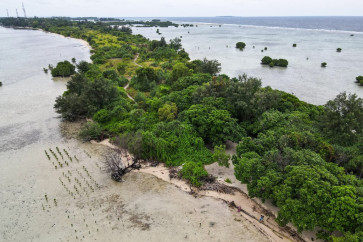ASEAN can help lead the way to Planet 50-50 by 2030
As the Association of Southeast Asian Nations (ASEAN) approaches its 50th anniversary this year, a momentous milestone, the region is at a crossroads more than ever on several fronts, including the rights, health and wellbeing of millions of women and girls
Change Size

A
s the Association of Southeast Asian Nations (ASEAN) approaches its 50th anniversary this year, a momentous milestone, the region is at a crossroads more than ever on several fronts, including the rights, health and wellbeing of millions of women and girls.
Policies and decisions taken now by individual countries and ASEAN as a whole can propel Southeast Asia toward greater prosperity grounded in human rights and genuine gender equality — helping fulfill the 2030 Agenda for Sustainable Development and its Sustainable Development Goals (SDGs) whose collective pledge is to leave no one behind.
Or, amid the growing tendency toward conservatism, and in some cases violent extremism, gains made in improving the health and fulfilling the rights of women and young people — especially girls — could be eroded.
These opportunities and challenges are reflected across the 2016-2020 Plan of Action to Implement the Joint Partnership between ASEAN and the United Nations, the focus of a high-level meeting between ASEAN and UN agencies in Jakarta this week.
The pillars of this plan include cooperation on the political, security, economic, socio-cultural, environmental, social welfare and public health fronts — across which the aspirations of the UN Charter and other key instruments that underpin the UN’s work are alluded to.
From our perspective at UNFPA, the plan of action contains clear commitments that reflect our vision of a world where every pregnancy is wanted, every childbirth is safe, every young person’s potential is fulfilled — and where everyone counts.
Family planning and sexual and reproductive health is a barometer of ASEAN’s success
All ASEAN member states have made strides over the past decades on key indicators including reductions in maternal mortality, a true test of the value countries place on the lives of their women.
For example, between 1990 and 2015, Cambodia achieved an 84 percent drop in the number of women who died from complications related to pregnancy or childbirth. For Lao People’s Democratic Republic, the corresponding decline was 78 percent and for Vietnam and Myanmar 61 percent each.
These numbers are linked to the availability of contraception and other family planning services to help avoid unplanned and unwanted pregnancies, as well as midwives and skilled birth attendants to help save women’s lives before, during and after childbirth, health sector capacity building that ASEAN has strengthened considerably via standardized guidelines and knowledge exchange between countries with UNFPA support — all under the umbrella of sexual and reproductive health and rights, and the wider framework of universal health coverage.
Consider the Philippines, for example, where the unmet need for family planning remains high at 33 percent. Not surprisingly, the maternal mortality rate has decreased only 7 percent from 1995-2015.
The landmark Responsible Parenthood and Reproductive Health law passed in 2012 and the inclusion of its full implementation in the new Philippine Development Plan 2017-2022 holds great promise for changing that, but only if legal barriers can be overcome.
If not, unplanned pregnancies will continue preventing women from achieving their full potential and hindering the nation’s progress.
In Thailand, a champion of universal health coverage, the unmet need for family planning is barely 7 percent, with the second-lowest maternal mortality ratio (after Singapore) within ASEAN — at 20 per 100,000 live births.
Yet teenage pregnancies in Thailand have risen alarmingly in the past decade, in part due to an absence of effective comprehensive sexuality education — common across ASEAN countries — prompting the Thai government to introduce important legislation last year, with UNFPA support, that seeks to address this situation by providing and expanding youth-friendly services, comprehensive sexuality education and supporting pregnant adolescents to remain in school.
In Indonesia, where the ASEAN Secretariat is based, the unmet need for family planning stood at nearly 13 percent in 2015, significantly lower than Cambodia (almost 30 percent), Lao PDR (at about 25 percent) and Myanmar (19.5 percent).
Indonesia’s long-running family planning programme has been lauded as a success story, and deservedly so.
But there are challenges going forward given the persistently high maternal mortality and staggered contraceptive prevalence.
Decentralization of public health services across Indonesia’s vast terrain in recent years, coupled with rising ideological conservatism and cultural preferences that emphasize larger families and seeks to restrict women’s and young persons’ choices, are already impacting access to sexual and reproductive health and rights.
Indonesia is by no means alone in this — similar patterns are being played out elsewhere in ASEAN and globally as well.
Addressing violence against women is a key challenge
Linked to sexual and reproductive health are the scourge of violence against women and other harmful practices, including child marriage — challenges that ASEAN has long recognized as a priority to be tackled.
Nine ASEAN countries, including Indonesia, have laws on domestic violence, although not all cover marital rape. Five countries have laws covering sexual harassment. And five countries have national action plans on addressing violence against women, seeking to ensure that laws are effectively implemented.
In several countries, and often with UNFPA support, governments are working to collect data on violence against women, to fully reveal the scope of the crisis and strengthen legislation and policy in an area all too often ignored by society as a whole.
ASEAN already has a strong regional action plan in place to eliminate violence against women. Now is the time to accelerate implementation of the plan, as well as of the national laws and plans of action that already exist. All ASEAN countries should amend or adopt legislation to address all forms of violence that affect women and girls.
And critically, governments need to boost investment in prevention and response, and ensure that health, justice and social welfare are harnessed in this effort.
Therefore, in achieving Planet 50-50 by 2030, can ASEAN meet the challenge?
ASEAN’s half-century occurs barely two years into the regional and global trek along the road to 2030 — a destination shared by governments, the UN family and civil society alike.
The Sustainable Development Agenda explicitly envisions a Planet 50-50 by 2030 — as spelled out via specific targets under Goal 5, Gender Equality, complemented by cross-cutting targets under many other SDGs.
The ASEAN-UN plan of action, across its various pillars, aspires to this as well.
At a time when the very components of gender equality, including sexual and reproductive health and rights, are under attack from so many quarters regionally and globally, the question before ASEAN is whether the organization and its member states can and will rise to the occasion in strengthening these rights — in individual countries and for the region as a whole.
The way in which the answer unfolds will be critical to the outcomes of not only ASEAN-UN collaboration, but the wider success of the 2030 Agenda in Southeast Asia and around the world.
__________________________
Yoriko Yasukawa is the Asia-Pacific regional director of the United Nations Population Fund (UNFPA) and Annette Sachs Robertson is the UNFPA country representative in Indonesia where the ASEAN Secretariat is based.









